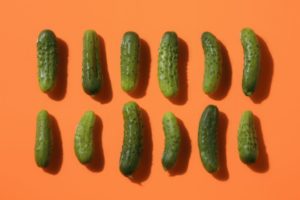Can Pickle Juice Really Cure Muscle Cramps?
Photo by: Getty Images Paul Taylor
Pickle Juice helps get rid of muscle cramps
Muscle cramps can make people do some pretty out-there things. Painful foam rolling? No problem! Look like a fool in public attempting to stretch it out? Sure! Drink pickle juice? Um…what?
Yup, this is a thing. Plenty of people—especially runners and football players—claim that drinking pickle juice can help tamp down on painful cramps and even prevent cramps from happening in the first place.
Does it really work?
Let’s back up a second here: Pickle juice is technically brine, which is basically really salty water. The sodium from the salt is where the benefits come from, most people think. Here’s why: When you get dehydrated (like after a hard workout), your body’s electrolytes (which include sodium and potassium) get thrown out of whack, explains Albert Matheny, R.D., certified strength and conditioning specialist, of SoHo Strength Lab and Promix Nutrition. That can cause involuntary muscle contractions, a.k.a. cramps. And according to research, pickle juice may, in fact, help. One small study published in the journal Medicine and Science in Sports and Exercise gave some men who had cramps pickle juice and others water. The researchers found that men who drank the pickle juice had cramps that lasted about 49 seconds less than those who drank water.
Since most people get cramps because of a lack of sodium, pickle juice will “definitely fix this,” says Matheny. “But it’s not much different from drinking some salt water.”
For the record, the types of exercisers who likely need to resort to something like drinking pickle juice are people who are running long distances in hot weather, football players who are working out for hours in pads in the heat, or people who are doing hot yoga, Matheny says.
If that’s you, you can try to have an ounce or two of pickle juice after you work out and see where that gets you, he says. Just chase it with a solid amount of water to make sure you’re staying hydrated, too.
Are there any drawbacks to drinking it?
If you have hypertension, adding a huge salt load to your diet could potentially be an issue (so talk to your doctor first), says Matheny.
Pickle juice could also dehydrate you if it’s the only thing you’re sucking down after a workout. But as long as you drink pickle juice in moderation and follow it with lots of water, you should be fine, he says.
But what if you can’t stomach pickle juice…?
Sports drinks like Gatorade and Powerade work to replace lost sodium and electrolytes in your body, but they don’t have as much of an impact as super-salty pickle juice if you’re doing extreme workouts in the heat, Matheny says. Still, they can help. If pickle juice isn’t your thing, try drinking a sports drink before, during, and after your hard workout and seeing where that gets you, Matheny suggests. You can also try adding a teaspoon of salt to 20 ounces of water and drinking it, he says. (You can add citrus fruit juice to the mix for flavoring.)
“The salt will actually help you absorb the water more efficiently,” Matheny says. Eating normally, i.e. not following a restrictive diet, can also help, he says.
Ultimately, if you’re not working out super-hard and for a long in the heat, you really don’t ~need~ pickle juice to help you out in the cramp department. But if you’ve found that you’ve been experiencing a ton lately, it could be worth a try…provided you can stand the taste.


